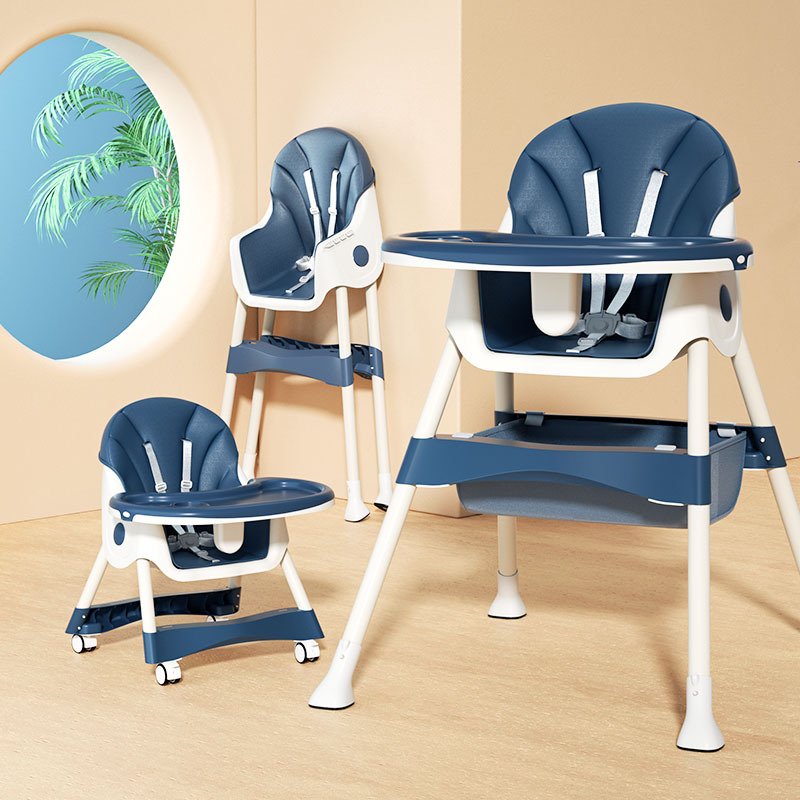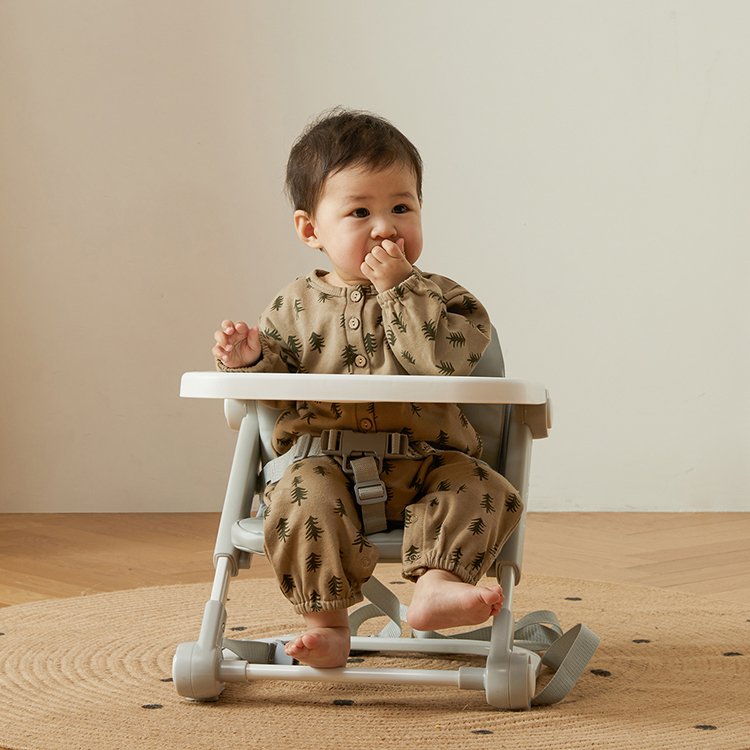Feeding time with your little one can be both messy and magical. But before you start serving up those pureed veggies or finger foods, there’s one big decision to make — should you go for a high chair or a booster seat?
Let’s dive deep into the world of baby seating options so you can find the one that fits your lifestyle, space, and your baby’s growing needs.
Table of Contents
- Understanding the Basics
- The Key Differences Between High Chairs and Booster Seats
- Pros and Cons of Each Option
- How to Choose the Right Option for Your Baby
- The Transition: When to Move from High Chair to Booster Seat
- Top Features to Look for in Both Options
- Safety Tips for Mealtime Seating
- Popular Types of High Chairs and Booster Seats
- Final Thoughts
- FAQs
- Share This Case:
Understanding the Basics
Before comparing, it’s important to understand what each product actually is and what it’s designed for.
What Is a High Chair?
A high chair is a tall, standalone seat designed to keep your baby safely elevated at table height during meals. It usually comes with a wide base for stability, a built-in tray, and a harness system to keep your child secure.
Think of it as your baby’s personal dining throne — sturdy, comfortable, and perfect for early feeding stages.

High Chair for Toddler
Light Weight Portable Baby High Chair for Both Infants and Toddlers
Features
- Stable & Safe Structure
- Adjustable Settings
- Comfortable Seating
- Removable Tray
- Foldable & Portable Options
- Modern Aesthetic
What Is a Booster Seat?
A booster seat, on the other hand, is designed to attach to a regular dining chair. It helps toddlers sit at the correct height for the table, often without needing a separate tray.
Booster seats are more compact, lightweight, and ideal for older babies or toddlers who are ready to join family mealtimes.

Portable Foldable Booster Chair for Baby
High Chair for Toddlers Folding Portable Booster Seat Babies/Kids Feeding Chair for Dining Table
Features
- Stable and Comfortable
- Fold and Take it Anywhere
- 4 Adjustable Heights
- Easy Clean
- Easy to Install and Take Down
The Key Differences Between High Chairs and Booster Seats
At first glance, they both serve the same purpose — helping your baby eat safely. But the differences lie in the details.
Size and Portability
High chairs are usually larger and take up more space. They’re perfect for home use but can be a hassle for travel. Booster seats are compact and easy to carry — ideal for dining out or visiting grandparents.
Safety and Stability
High chairs typically offer better stability and safety for younger babies who can’t sit up independently. Booster seats, while secure, rely on the stability of the chair they’re attached to.
Age and Weight Suitability
High chairs are best suited for babies from 6 months to around 2 years, while booster seats are perfect for toddlers from 18 months up to 5 years.
Cleaning and Maintenance
High chairs can be bulkier to clean, especially those with cushions and crevices. Booster seats are often easier to wipe down and have fewer parts.
Price Range
Generally, booster seats are more affordable, while high chairs can vary widely depending on brand, design, and features.
Pros and Cons of Each Option
Every parent’s situation is different — so let’s weigh the ups and downs.
Advantages of High Chairs
- Great for younger babies who need extra support
- Often come with built-in trays
- Many models include reclining options
- Provide a dedicated, safe feeding space
Drawbacks of High Chairs
- Bulky and take up space
- Harder to travel with
- More expensive on average
Advantages of Booster Seats
- Compact and portable
- Budget-friendly
- Encourages social mealtime interaction at the table
- Easy to clean
Drawbacks of Booster Seats
- Relies on the sturdiness of the adult chair
- Not ideal for very young babies
- May require frequent adjustments as your child grows
How to Choose the Right Option for Your Baby
Consider Your Baby’s Age and Development Stage
If your baby is just starting solids (around 6 months), a high chair offers more support. If they’re already sitting independently and want to be part of family meals, a booster seat might be the better choice.
Think About Your Space and Lifestyle
Small apartment? A booster seat that straps to an existing chair saves precious floor space. But if you have room to spare, a stylish high chair can even complement your dining decor.
Look at Ease of Cleaning
Babies are professional mess-makers. Pick something easy to wipe down, preferably with a removable tray and washable seat cover.
Don’t Forget Safety Features
Always check for five-point harnesses, non-slip bases, and solid locking systems. Your baby’s safety should never be compromised.
Factor in Portability and Travel Needs
If you often eat out or travel, a lightweight, foldable booster seat will make your life a lot easier.
The Transition: When to Move from High Chair to Booster Seat
Signs Your Baby Is Ready
- They can sit up unsupported
- They’re interested in sitting at the table
- They’re getting too big for the high chair harness
- They can feed themselves (or at least try!)
How to Make the Switch Smoothly
Start by using the booster seat for one meal a day. Keep supervision close, and ensure the booster is securely fastened. Before you know it, your toddler will be proudly sitting at the “big kid” table.
Top Features to Look for in Both Options
Adjustable Height and Recline
Babies grow fast! Adjustable seats ensure long-term use and comfort during different feeding stages.
Easy-to-Clean Trays and Materials
Opt for detachable trays and wipeable materials to save yourself endless scrubbing.
Secure Harness Systems
A 5-point harness keeps younger babies safe, while a 3-point harness works well for older toddlers.
Compact Folding Design
If you’re tight on space or travel frequently, look for a foldable design for easy storage and transport.
Safety Tips for Mealtime Seating
Always Supervise Your Child
Never leave your baby unattended in a high chair or booster seat — even for a second.
Proper Installation and Positioning
Ensure straps are snug, trays are locked, and the chair or table is on an even surface.
Check for Product Recalls
Before buying, check safety recalls from trusted sources. Baby gear evolves fast — better safe than sorry!
Popular Types of High Chairs and Booster Seats
Traditional High Chairs
Sturdy, padded, and often with adjustable features — a great long-term investment.
Foldable or Portable High Chairs
Perfect for families on the go or those with limited space.
Clip-On Booster Seats
These attach directly to the table — great for travel but must be used with caution and proper setup.
Convertible 2-in-1 Designs
Some modern designs transition from high chair to booster seat, giving you the best of both worlds.
Final Thoughts
At the end of the day, there’s no one-size-fits-all answer. A high chair offers more support for babies just starting solids, while a booster seat grows with your child and makes family meals more inclusive.
Your choice depends on your baby’s age, your lifestyle, and the space you have. Whatever you choose, prioritize safety, comfort, and convenience — and you’ll be ready for many happy, (and yes, messy) mealtimes ahead!
FAQs
1. What age should my baby start using a high chair?
Most babies are ready around 6 months, once they can sit upright with minimal support.
2. When should I switch from a high chair to a booster seat?
Typically between 18 months to 2 years, depending on your child’s development and size.
3. Are booster seats safe for daily use?
Yes — as long as they’re securely attached to a sturdy chair and have a safety harness.
4. Can I use a booster seat on any chair?
Avoid unstable or lightweight chairs. Always use sturdy, non-tipping dining chairs for safety.
5. What’s the best way to clean a high chair or booster seat?
Wipe down after each meal, remove trays for washing, and deep-clean straps and crevices weekly.



